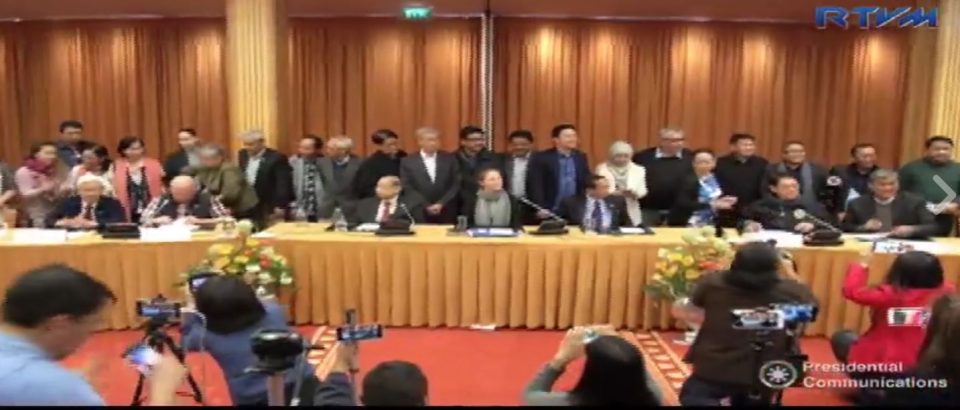
(Eagle News) — The Philippine government and communist rebels on Wednesday, April 5, signed an interim ceasefire agreement which both parties hailed as a big step toward achieving a just and lasting peace in the country.
The interim ceasefire will boost ongoing peace talks aimed at ending one of the world’s longest insurgencies, a joint statement said.
The temporary truce would take effect after the two sides iron out the guidelines and ground rules, they said without giving a timetable.
“This is another step closer to our dream. There are still many steps that we have to work on but this is a very important step,” Philippine President Rodrigo Duterte’s peace adviser Jesus Dureza said during the signing ceremony of the interim ceasefire agreement.
“This will go a long way in building trust and confidence and generating the atmosphere for the accelerated advance of negotiations,” rebel leader Jose Maria Sison told a joint news conference Wednesday in the western Dutch town of Noordwijk aan Zee.
“We have defined the road forward in making our bilateral ceasefire agreement,” said National Democratic Front of the Philippines’ chief negotiator Fidel Agcaoili who described the fourth round of talks as “a difficult three days.”
GRP panel chair Silvestre Bello III described the deal as a “well crafted interim ceasefire agreement.”
“This is a major breakthrough in our peace process. After 30 years of talking, finally we did something significant to move the process forward. Hopefully this will significantly move the process to its logical conclusion and that is lasting peace for our country,” Bello said.
The Special Envoy to the Philippine Peace Process of the Royal Norwegian Government, Elisabeth Slattum, congratulated both panels for the interim peace agreement.
“It is my immense pleasure to announce that the parties today have reached an agreement on an interim joint ceasefire which will put into effect up on the approval and signing of the guidelines and ground rules,” Slattum said.
She announced the agreed objectives of the two parties which were the following:
1. To generate good will and trust in the peace process;
2. To encourage the forging of a more stableand comprehensive joint ceasefire agreement
3. And to provide an enabling environment for the early signing for eventual and early signing of the Comprehensive Agreement on Social and Economic Reforms.
The two parties also agreed that the guidelines and the ground rules shall be formulated by the respective ceasefire committees, and include rules governing the presence of armed units and the creation of buffer zones; an agreement on hostile and provocative acts; and monitoring and verification mechanisms.
Both parties also agreed to discuss matters regarding a single governmental authority. The controversial issue of taxation will also be discussed and hopefully be resolved in the forging of the comprehensive agreement on the political and constitutional reforms. All of these is within the framework of the proposed Federal Republic of the Philippines, Slattum said.
Communist Party of the Philippines founder Sison said the NDFP is interested in co-founding the proposed Federal Republic of the Philippines, with the Philippine government.
“I think the negotiators were wise and flexible enough to make provision for what some people expected would break up the negotiations,” he said.
“You know when we reached the stage of discussing political and constitutional reforms, we can not avoid considering the attributes and functions of what may be a single governmental authority,” he said.
“I think I have indicated in advance that if we co-found the Federal Republic of the Phili — if the GRP and the NDFP co-found the Federal Republic of the Philippines — then there is no question of surrendering to a pre-existing government,” Sison added.
The communist insurgency in the poverty-stricken Asian country began in 1968 and is one of the longest-running in the world. It has claimed an estimated 30,000 lives, according to the military.
About 4,000 New People’s Army guerrillas continue to attack isolated military and police outposts and extort money from businesses to finance their armed campaign, the military said.
Peace talks have been on and off for 30 years, seeing a revival after the election of Duterte last year.
Duterte has made a peace deal with the rebels a top priority.
The government has billed a permanent ceasefire as its primary goal, with Duterte imposing conditions including that the rebels stop extortion and arson activities.
The interim agreement followed what negotiators described as a “difficult” round of discussions, with the communists insisting they exercised “maximum flexibility” in response to the president’s conditions.
Duterte angrily called off the peace talks in February after the collapse of unilateral ceasefires that saw guerrillas killing several soldiers and police in a series of attacks.
The interim ceasefire agreement directs negotiators to craft guidelines regarding “the presence of armed groups in local communities, creation of buffer zones, prohibited, hostile and provocative acts including the collection of revolutionary taxes”.
Dureza told the news conference these discussions were already underway.
The guerrillas are represented at the talks by Dutch-based exiled leaders including Sison, founder of the Communist Party of the Philippines.
Also Wednesday, the two sides announced they would release prisoners as another confidence-building measure.
The communists said they would soon free four kidnapped security forces, while the government said it would release 23 detained rebels who were sick and elderly.
(with a report from Agence France Presse)
https://youtu.be/b-uaeELF-cw







